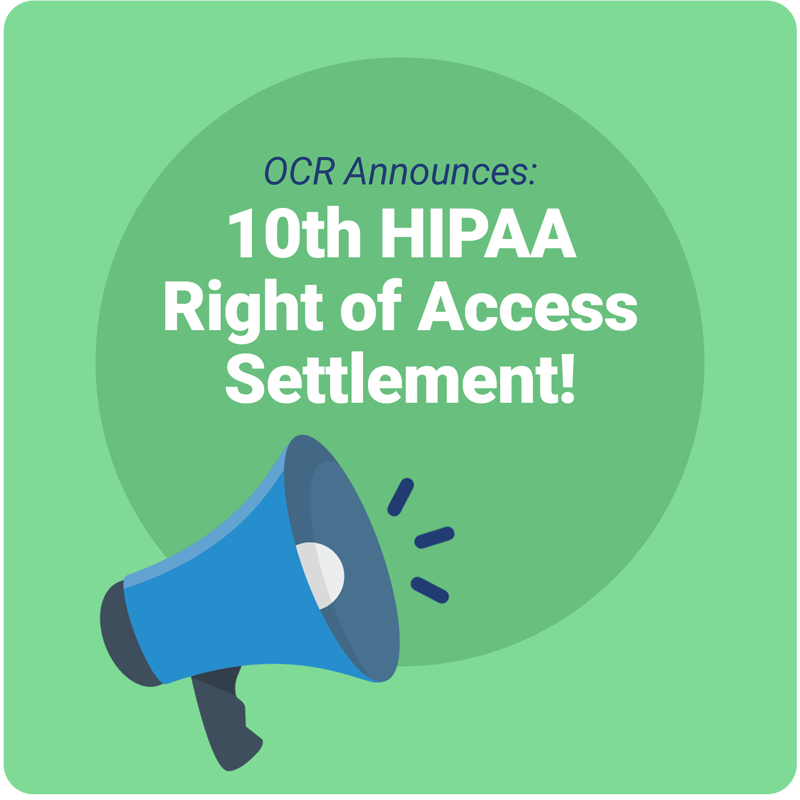March 26, 2021 Looks like the Office for Civil Rights (OCR) just decided to play a quick round of 18 – announcing their 18th right of access settlement (and second of the week) with yet another practice who’s HIPAA compliance efforts were well below par. Village Plastic Surgery (“VPS”) was the latest to tee off against the OCR in a matchup that resulted in a $30,000 fine and two year corrective action plan. And with the 17th right of access settlement announced only two days ago – the tough loss endured by the New Jersey-based provider was just par for the course. The round began back in September of 2019, after a patient filed an all too familiar complaint to the OCR that the practice had failed to respond to their record request that was made a month prior. Unlike previous settlements where the organization was first provided with technical assistance, all it took was a single patient complaint for the OCR to determine that VPS failed to meet right of access standards – setting the tone that there are no mulligans when it comes to a HIPAA violation. It’s pretty clear that if you’re not meeting HIPAA requirements, becoming the next opponent on the OCR’s lineup is anyone’s game. But if two fines in one week don’t drive the point home, maybe the latest statement from OCR Director Robinsue Frohboese will be right on target: “OCR’s Right of Access Initiative continues to support and enforce individuals’ vital right to receive copies of their medical records in a timely manner, covered entities must comply with their HIPAA obligations and OCR will take appropriate remedial actions if they do not.” So, with $5,540,000 collected in HIPAA fines just in 2021 alone and patient right of access being a clear government focus – ensuring that your practice’s compliance program is up to par is the best and only way to steer clear of the next round of OCR enforcement.
OCR Continues to Take Non-Compliance By Storm – Announcing 17th Right Of Access Settlement
March 25, 2021 We are definitely no meteorologists over here but if there’s one pattern that we’ve gotten pretty good at predicting, it’s the government’s focus on HIPAA non-compliance. And with another right of access settlement hitting our inboxes just yesterday – it’s looking like HIPAA enforcement season is in full effect. Arbour, Inc., d.b.a Arbour Hospital (“Arbour”), was the latest to get caught in the Office for Civil Rights (OCR) storm – but instead of heavy rainfall and thunder, the Massachusetts-based behavioral health provider was hit with a whooping $65,000 fine and corrective action plan. The announcement marks the 17th right of access settlement since the OCR declared their enforcement initiative back in the fall of 2019, proving that whoever said that lightning never strikes the same place twice clearly didn’t know HIPAA. Arbour first showed up on the OCR’s radar back in July of 2019, after they received a complaint alleging that the practice had failed to respond to a patient’s record request in a timely manner. Despite the OCR providing technical assistance, the practice took a rain check on providing record access and a second patient complaint came rolling in later that month. As a result of the OCR’s investigation, Arbour finally provided the patient with their records more than 5 months after the patient’s initial request – making the perfect storm for a HIPAA violation. With 17 cases settled and $1,068,500 collected in fines since the right of access initiative began, it’s looking like when it rains, it pours as far as OCR enforcement is concerned. And if the numbers aren’t telling enough, Acting OCR Director Robinsue Frohboese made their storm-warning loud and clear in her latest statement: “Health care providers have a duty to provide their patients with timely access to their own health records, and OCR will hold providers accountable to this obligation so that patients can exercise their rights and get needed health information to be active participants in their health care.” A key takeaway from the 17 practices’ caught in the government’s flood zone? In more than half of the published settlements, the organization was notified twice by the OCR and provided with technical assistance. And if they had listened to the first warning siren, they could’ve potentially avoided the settlement entirely. Since taking timely action in response to a patient’s records request has shown to be an ongoing issue for covered entities of all specialties and size – with the proposed HIPAA Privacy Rule changes shortening the record response time from 30 days to 15 days, we can foresee dark skies ahead if practices don’t start complying. So, how do you avoid the hailstorm that comes with an OCR audit? Simply put, ensuring your practice adheres to state and federal Patient Right of Access laws while also having the necessary policies and procedures to back it up is a great place to start. But in order to fully weather the elements of government enforcement, you must meet ALL of the requirements that fall under the HIPAA umbrella and keep your compliance program a priority come rain or shine.
OCR Announces 16th Right of Access Settlement
February 12, 2021 Today the Office for Civil Rights (OCR) is celebrating their Sweet 16 – sixteenth HIPAA Right of Access fine, to be exact. Instead of party hats and birthday cake, they’re kicking off the festivities with a hefty settlement and second HIPAA fine this week. The not so lucky guest of honor is Sharp HealthCare, d.b.a. Sharp Rees-Stealy Medical Centers (“SRMC”), a health care provider based out of California. SRMC was gifted with a $70,000 fine along with a 2-year corrective action plan for violating HIPAA right of access requirements. The ‘party’ began back in June of 2019 after the OCR received a complaint stating that SRMC failed to respond when a patient requested an electronic copy of their protected health information (PHI) be sent to a third party (sound familiar?). The ‘party’ didn’t stop there, when even after providing technical assistance the OCR received a second complaint just two months later alleging that SRMC had still yet to provide the requested access. It wasn’t until after the OCR investigated further that SRMC finally fulfilled the patient’s request. Not only did today’s announcement take the cake (party pun intended) for the second fine released just this week, but the details of the most recent settlements are so similar we feel like we’re seeing double. Both fines were a result of patient right of access violations, and more specifically for the failure to provide an electronic copy of health records to a third party. So the lesson to be learned? Ensure your practice is providing access in a timely manner and in the way it was requested. Acting OCR Director, Robinsue Frohboese emphasized the government’s continued focus in today’s press release, “Patients are entitled to timely access to their medical records. OCR created the Right of Access Initiative to enforce and support this critical right.” After a historic year in HIPAA enforcement, four HIPAA settlements in the first two months of 2021 should come as no shock. If crashing the HIPAA violation party isn’t something you’re keen on (we’re not the life of the party ourselves, but even we don’t think that would be too much fun) then having the right policies and procedures in place along with the proper employee training on how to respond to record requests is key.
OCR Settles 15th Right of Access Violation
February 10, 2021 The Office for Civil Rights (OCR) started 2021 off with some heavy hitters – including a $5.1 MILLION fine only 15 days into the year – but their fifteenth HIPAA right of access settlement (and counting – we’re taking bets on how many they get in before the end of the year) emphasizes they’re not just going after the big guys when it comes to keeping HIPAA programs in check. Renown Health, P.C., a private, not-for-profit health provider out of Nevada, became the third HIPAA violator of the new year after failing to meet HIPAA right of access requirements back in 2019. The violation came with a hefty penalty of $75,000, along with a 2-year corrective action plan. So what happened? This time two years ago, the OCR received a complaint that Renown Health failed to fulfill a patient’s request for an electronic copy of their medical and billing records. In this particular instance, the patient had requested to have it sent to a third party – something that HIPAA not only allows for, but expects providers to fulfill. Singing the same tune as last year’s many access-related fines, it wasn’t until after the OCR got involved and investigated further that Renown Health finally provided access to all of the requested records. Acting OCR Director, Robinsue Frohboese, weighed in on the latest settlement, “access to one’s health records is an essential HIPAA right and health care providers have a legal obligation to their patients to provide access to their health information on a timely basis.” What this means for you With 15 right of access settlements under their belt, the OCR has made it clear that providing proper access in the way records are requested is key – not to mention the ticking clock (30 days, or less depending on the state) that goes with any record request. With the proposed changes to the HIPAA Privacy Rule suggesting an even shorter time frame to respond to record requests, providing timely access should be on every practice’s radar. If it’s not, or even if it is, making sure to have documented policies around how records are provided and recording requests in a written format is key to preparing your practice should you wind up as part of the OCR’s right of access crusade. Not sure where your current HIPAA program stands, especially when it comes to patient’s access rights? Schedule a complimentary consultation with one of our HIPAA experts today to see what you might be missing before it’s too late!
OCR’s First Settlement of the Year: More HIPAA Right of Access Violations
January 12, 2021 The Office for Civil Rights (OCR) wasted no time starting on their new year’s resolutions, announcing their 14th settlement as part of the HIPAA right of Access initiative just 2 weeks into 2021. Patient right of access fines are starting to become a monthly occurrence, and it’s no surprise that the OCR would start off the new year with the same enforcement efforts they ended 2020 with. Banner Health, an Arizona-based non-profit health system operating 30 hospitals, primary care, urgent care, and specialty care facilities across the country, became the OCR’s first victim of the year with the largest right of access fine to date – $200,000. This hefty payout comes as a result of two separate complaints filed against Banner Health, both highlighting the health systems noncompliance with the HIPAA right of access standard. If today’s settlement isn’t enough reason to avoid dragging your feet on records requests and getting HIPAA compliant ASAP, maybe the latest statement from OCR Director Roger Severino will seal the deal: “This first resolution of the year signals that our Right of Access Initiative is still going strong and that providers of all sizes need to respect the right of patients to have timely access to their medical records.” The OCR has clearly hit the ground running with HIPAA enforcement in the new year and it’s more important than ever to get your practice compliant. OCR Director Roger Severino has been beating the same right of access drum for over a year, and it’s no surprise given that audit results released just this past December show that most covered entities (a whopping 89%) don’t meet patient access requirements. Concerned your practice falls in that boat? Schedule a consultation today with one of our HIPAA experts to see where you currently stand and what you need to do to avoid falling into the government’s crosshairs in 2021.
OCR Announces 13th Right of Access Fine, Drives Home Importance of Record Requests
December 22, 2020 The Office for Civil Rights (OCR) has been in the giving spirit the past few months, and they couldn’t close out 2020 without handing out at least one last holiday gift. We know there’s only 12 days of Christmas as the song goes – and we don’t think the OCR will be handing out lords-a-leaping or piper’s piping anytime soon – but there IS one more gift not mentioned in the classic song (at least the OCR 2020 edition): 13 patient right of access fines. The latest settlement adds to quite a historic year for HIPAA enforcement – and proves just how unprepared many practices have been when it comes to HIPAA compliance. This week’s extra gift went to Peter Wrobel, M.D whose practice Elite Primary Care out of Georgia found themselves doing a little extra holiday spending this year after settling with the OCR for $36,000. The settlement resolved a patient right of access complaint from April 2019, which took over a year to fully wrap (present-related pun intended). Here’s the highlights from this latest fine: Important notes for any covered entity? Make sure to provide records in a timely manner, AND in the way the patient requests them. Additionally, requests can be submitted in any form (verbal, written or otherwise) but documented, written requests are always key to best protecting your practice and meeting timeframe requirements. Take a minute to brush up on how to handle access requests if your practice needs a refresher. Taking over a year to get records access is already a bad call, but proposed changes to the HIPAA Privacy Rule will make the typical 30 day timeframe to provide records even shorter. When it comes to patients getting access to their own PHI, the OCR is serious about keeping covered entities of all sizes in line. While this may not have been the gift Elite Primary Care was wishing for this year, it did come with is some wise words of advice from OCR Director, Roger Severino: “OCR created the Right of Access Initiative to address the many instances where patients have not been given timely access to their medical records. Health care providers, large and small, must ensure that individuals get timely access to their health records, and for a reasonable cost-based fee.” We hope your practice gets a better gift this year than a hefty fine – but if you aren’t certain where you stand, get the gift of confidence in your HIPAA program by scheduling an educational webinar today!
What You Need to Know About HIPAA Patient Right of Access Laws
November 20, 2020 Wanna know the secret to avoiding patient complaints? Well, until we figure out the trick to making everyone happy (which is next to impossible) we can at least fill you in on the next best thing – how to avoid one of the main causes of patient complaints – improper patient record access. You might be thinking, how can providing patients access to something that’s already theirs be that hard? Yet more than half of practices still fail to comply with patient access laws, opening themselves up to complaints and ultimately HIPAA fines. In fact, the Office for Civil Rights (OCR) just recently announced the 12th settlement in their right of access enforcement initiative, further emphasizing the importance of providing proper access. The Boring Stuff: What is the Right of Access law? The HIPAA Patient Right of Access law was created to provide patients with a level of ownership over their own medical records. This means that patients are able to: What information can be provided to a patient? Does this mean that your practice has to go and round up every single one of Sally Smiths’ records when she asks for it? Not necessarily – when a patient asks for access to their records there is specific information that you are legally expected to provide which is referred to as the “designated record set” and includes: RELATED: Your Patient Requested Access to their Medical Records, Now What? Ok, so…what information shouldn’t be provided? Now before you go and slap a postage stamp (or hit send on that encrypted email) with the entire patient file, there is some information that can be left out of the designated record set. Any information that does not pertain to decisions made about the patient’s health directly does not have to be provided to patients such as: There’s a host of other requirements when providing patient records, and knowing what policies the Right of Access law includes is important to avoiding patient complaints about record requests. Unless you’re a professional people-pleaser, dealing with patient complaints is inevitable – but with HIPAA right of access enforcement continuing to ramp up, it’s an important topic to keep your practice up to speed on.
OCR Continues HIPAA Right of Access Fine Streak, Announces 12th Settlement
November 19, 2020 Reporting new HIPAA settlements has become a weekly routine this month (we’ve got our calendars marked for next week’s already), and after today’s announcement on the Office for Civil Rights (OCR) 12th right of access initiative settlement (the third in November), we now have enough patient right of access fines to last us a whole year. This week’s HIPAA headline goes to the University of Cincinnati Medical Center, LLC (UCMC), an academic medical center that provides healthcare services to the Greater Cincinnati Community. UCMC agreed to a $65,000 payout as well as a 2-year corrective action plan with the OCR to settle a violation of (you guessed it) the HIPAA right of access standard. The by-now familiar story began back in May of 2019, when the OCR received a complaint that UCMC failed to respond to a patient’s request that her electronic health records (EHR) be sent directly to her lawyers on February 22, 2019. After further investigation and a little push from the OCR, the medical center finally provided the requested records in August of that year. While we’ve seen more than a handful (2 handfuls plus two fingers to be exact) of patient right of access fines over the past year, this specific settlement is a great example of not only failing to provide patient records in a timely manner, but also in the proper format they were requested in. It is required under HIPAA law to be able to provide patients with a copy of their records in the format they request – either in paper or electronic form – as well as have the ability to transmit records directly to a third party if specified. If it isn’t possible to provide records the way a patient requests, the covered entity must agree to an alternative method with the requester. Emphasizing the importance of providing records in the format requested, OCR Director Roger Severino added that the “OCR is committed to enforcing patients’ right to access their medical records, including the right to direct electronic copies to a third party of their choice. HIPAA covered entities should review their policies and training programs to ensure they know and can fulfill all their HIPAA obligations whenever a patient seeks access to his or her records.” Today’s settlement brings the running count of 2020 HIPAA fines to a total of $13,291,500 with 6 weeks still left in the year. If the weekly fine trend continues, we could expect at least 6 more HIPAA settlements and a whole lot of $$$ to come rolling in before 2020 finally ends. While we’re all looking forward to 2020 calling it quits, 6 more fines would blow 2019’s enforcement records out of the water. With annual HIPAA deadlines right around the corner and weekly examples of why you should ensure your practice is compliant, we couldn’t think of a better time to add HIPAA to the top of your to-do list!
OCR Announces the 11th HIPAA Right of Access Settlement
November 12, 2020 The last few months have shown that it’s not a matter of when the next Office for Civil Rights (OCR) HIPAA fine will drop, it’s how much the fine will be for. It’s sort of become a race at the Abyde office to share the news first when the OCR’s next press release hits our inboxes (seriously – this blog’s authors are winning in case you were concerned). Today’s entry into our fine-marathon is yet another patient right of access violation – bringing total access settlements to 11 and 2020’s fine count to $13,226,500. The latest right of access violator is Dr. Rajendra Bhayani, a private practitioner specializing in otolaryngology (a specialty focused on the ears, nose, and throat, if you aren’t a medical specialties trivia whiz) out of New York. The settlement comes as a result of a patient complaint regarding a violation of the Privacy Rule’s right of access standard and left Dr. Bhayani with a $15,000 bill and a two-year corrective action plan to boot. Back in September 2018, the OCR received a complaint that Dr. Bhayani failed to respond to a patient’s request for medical records made in July of that year. The OCR responded by providing the doctor with technical assistance on the issue, and it was case-closed (or so they thought). Half a year later, complaint number two came rolling in, noting that even in July of 2019 the patient still hadn’t received their requested records. Only after further OCR investigation were the records finally provided in September of 2020 – two whole years after the initial complaint. The OCR is certainly taking this right of access fine-marathon seriously, sprinting to the end of 2020 with 9 right of access related fines since September. “Doctor’s offices, large and small, must provide patients their medical records in a timely fashion,” stated OCR Director, Roger Severino, “we will continue to prioritize HIPAA Right of Access cases for enforcement until providers get the message.” The best way to tell the OCR ‘message received’? Get your HIPAA program in order NOW, particularly all the pieces that go into patient right of access – HIPAA authorization forms, the right access policies and timeframes, staff training, and more. OCR Director Severino said it best – it doesn’t matter if your practice has 3 employees and sees only a handful of patients, dealing correctly with HIPAA requirements is essential to avoiding $$$ in fines and the scrutiny of the OCR.
OCR Announces the 10th HIPAA Right of Access Settlement
November 6, 2020 The Office for Civil Rights (OCR) wasn’t kidding when they emphasized HIPAA Right of Access enforcement last year – if you STILL don’t believe the many (so, so many) blog articles we’ve written on previous fines, maybe today’s 10th fine announcement will do the trick. Patient right of access has been a trending topic (waiting for the hashtag to trend any day now) over the past few months, and the latest settlement is just another reminder of what your practice needs to watch for. Today’s fine goes to Riverside Psychiatric Medical Group (RPMG), out of Riverside, California who agreed to a $25,000 payout and two-year corrective action plan to settle a violation of the Privacy Rule’s patient right of access standard. The latest settlement comes as a result of a patient complaint received just last year, in March of 2019. The complaint claimed that RPMG failed to provide access to requested medical records – even after multiple requests, OCR technical assistance after the first complaint, and a second complaint a month later. In this particular case, unlike other patient right of access fines levied thus far, RPMG claimed they didn’t provide access because the requested records included psychotherapy notes. Psychotherapy notes include documentation of private counseling sessions, separate from regular medical records, and are able to be withheld under HIPAA law because of the nature of the records. So was the practice actually in the wrong? While psychotherapy notes CAN be withheld, HIPAA still requires: Since RPMG failed to do either, they found themselves with $25,000 less in their pockets and two whole years of administrative paperwork to be completed. Even if your practice doesn’t deal with mental or behavioral health services, RPMG’s case includes some important lessons for all types of providers. When records can’t be provided (for legitimate reasons only people) a written explanation and a copy of the records can and should be provided to the patient. No one likes to be left hanging, said best by OCR Director, Roger Severino himself: “When patients request copies of their health records, they must be given a timely response, not a run-around.” Avoid being an enforcement victim by reviewing what your practice has in place now, and what is required when a patient requests their records. Make sure you have a designated method for patients to request records and fulfill their requests within the right time frame – within 30 days at the federal level, though it varies by state. And just in case you’re keeping score (just us?) this fine brings 2020’s running total to $13,211,500.









